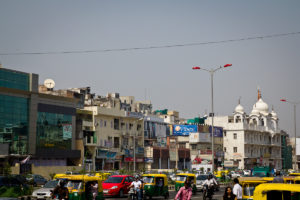On Being Brown-ish
 Being an Indian American girl in India is a bit of a shock for one's self esteem. One day, when I walked into a local salon to get my hair cut, I was asked to start a program that would even out my complexion. The recommended treatment would essentially endeavor to "remove my tan." I was being told by these cosmeticians that my skin color was imperfect, that I was supposed to have a much paler, whiter skin tone. I was stunned, to say the least.
Being an Indian American girl in India is a bit of a shock for one's self esteem. One day, when I walked into a local salon to get my hair cut, I was asked to start a program that would even out my complexion. The recommended treatment would essentially endeavor to "remove my tan." I was being told by these cosmeticians that my skin color was imperfect, that I was supposed to have a much paler, whiter skin tone. I was stunned, to say the least.
On a less extreme level, my boss at the paper noticed when I didn't wear eyeliner one day. At lunch, she said I looked different, something about my face seemed to have changed. So different, she thought maybe I had worn glasses the previous week. After a few moments she determined, no, it wasn’t glasses, it was my lack of eye makeup. She said that when you get used to seeing Indian women with their eyes lined in black kohl, they look starkly different without it. Personally, after a year of college I'd begun to wear less eyeliner daily, sometimes simply in order to sleep in a few extra minutes (Don't judge me. It happens. We've all been there). And people back at school in the United States generally treated me the same, with most of my friends not noticing whether my eyes were lined or not. So I'd grown accustomed to a degree of relaxed makeup and was a bit shaken by my boss's comment. I am sure she meant it only in a positive way, but it got me thinking.
I’ve noticed that people in Delhi talk pretty openly about the appearances of others. Mere strangers feel qualified to voice their opinion upon unsuspecting individuals who entered their shop, worked alongside them, or simply crossed their path.
The norms here in India are different. Most girls, once they stop being toddlers, barely ever wear shorts in public. Even older boys rarely do. My grandmother finds them appalling, unflattering, too revealing, and impractical.
The appropriate cultural norms extend beyond appearance. Whereas in the U.S., it's considered impolite to stare, here walking down the street is asking for constant and blatant stares. It's not just men ogling women either. Women of all ages, from the wide-eyed cleaning lady's youngest daughter to the stooped greying woman whose squint is still plenty sharp give me an up-down as I pass by.
At first I thought it was my clothes, so for the first time since I started visiting India as an infant, I took considerable pains to avoid shorts, tank tops, and short dresses, even if it meant wearing black jeans in 100 degree weather. But when I looked more or less like the average Indian teen on the street, I still could feel the eyes of others on me as I walked past. In a moment of frustrated paranoia, I wondered if they could somehow sense that I didn't belong, that I hadn't been born here, despite my best efforts to conceal it outwardly.
After many weeks, I began to relax my efforts to fit in. Having determined that I'd feel uncomfortable either way, I occasionally donned a t-shirt and Nike shorts. However, I soon reverted to the more conservative street look when I had to leave the house for extended periods of time because by that point, I'd gotten used to the shirts with sleeves and pants that covered my knees.
While the Indian norms may seem strange to the average outsider, they don't bother the locals, because they can't imagine life any other way. After more than a month in Delhi, I decided that if one can't beat them (or change their minds), it's better and relatively easier for everyone to just join them.
